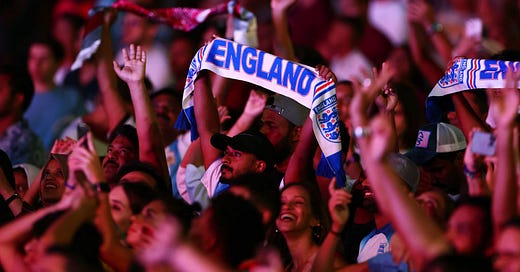Hello and welcome to Off to Lunch. I hope you all had a great weekend.
To mark the start of the World Cup there is a sporting theme to today’s Off to Lunch. I want to look at some of the interesting sporting stories to follow in the tournament over the next month. As I have written before, I am fascinated by what business and other fields can learn from elite sport, whether it is leadership, innovation, decision-making or strategy. There are few better opportunities to explore these ideas than the month-long festival of football that is the World Cup.
The quality of the sport over the next four weeks may not reach the peak that the best club sides can hit given the months of coaching and preparation they enjoy and the hundreds of millions of pounds they have spent on players. However, winning the World Cup remains the highest honour in the sport. As a consequence, various truths are revealed in the process about individuals and teams. In the past the battle to win the World Cup has shown the power of leadership, innovation and luck. Whether it be the Total Football of the Dutch team in 1974 - who sacrificed specialisation for flexibility and are regarded as one of the most innovative sporting teams ever - the leadership and wingless-wonders of Sir Alf Ramsey in 1966 or the brilliance of Diego Maradona in 1986 - fascinating stories will emerge…
A lot has been written about the wrongs of hosting this tournament in Qatar. I recommend Josh Glancy’s piece in The Sunday Times (and the comments below) for more on this. It looks at the hypocrisy, the weirdness, the migrant workers, the lack (or not) of alcohol, the women and LGBT rights and what it is like on the ground. You can read it here.
In terms of the on-pitch stories, here are some to watch:
How does a successful leader avoid overstaying their welcome
By any fair measure, Gareth Southgate has been a hugely successful manager of England. The team reached the semi-finals of the last World Cup in 2018 and lost in the final of Euro 2020 to Italy. However, Southgate has faced criticism going into this tournament and murmurings of discontent among supporters, as well as disappointing results and performances in the Uefa Nations League.
The flaws that played a role in the defeats in the last two tournaments - being over-cautious, failing to adapt and change the game with substitutes - are increasingly being used against Southgate over the strengths that got England so far into those tournaments - savvy team-building, strong set pieces, and smart team selections.
I have written before about the fact that Premier League managers have a much shorter tenure than FTSE 100 chief executives but also that football teams are much, much more likely to look externally for a new boss than a FTSE 100 company. The hunt for fresh ideas and fresh impetus is relentless.
This is Southgate’s third big tournament as England manager. The last England manager to reach his third tournament was Sven-Goran Eriksson at the 2006 World Cup. He had already announced he was standing down before the tournament and England underwhelmed, losing in the quarter-finals. Can Southgate lead England through another tournament? Can he go one better this time and win it? Or will his coaching and management seem stale and be exposed? Also check out Didier Deschamps and France for this one. Deschamps has been manager since 2012, leading France to the final of Euro 2016 and victory in the last World Cup. Speaking of which…
The challenge of staying no.1
One of the beauties of sport and the tournament format is that everyone starts from a blank-slate - zero points. The previous winner has no structural advantages and must do it all from scratch again. This has had remarkable consequences for the previous three winners of the World Cup - they all got knocked out in the group stage - Italy in 2010, Spain in 2014 and Germany in 2018. The same happened to France in 2002 after they won the 1998 World Cup.
France’s shock exit in 2002 led to a change in the rules whereby the holder no longer automatically qualified for the World Cup. This was because what was thought to be a reward for the previous champions ended up putting them at a disadvantage because they didn’t have to qualify for the tournament and therefore didn’t play any competitive matches in the run-up to the World Cup. Italy, Spain and Germany didn’t have this excuse, however.
The last team to retain the World Cup was Brazil in 1962. It will be fascinating to see how France get on. Complacency, a failure to adapt to the innovation of others and simply not having the quality of rival teams have all played a role in the struggles of the previous winners…
The role of luck and adaptability
The best team does not necessarily win the World Cup. You will hear that a lot over the next month. But what does it mean? Well, a team could outplay an opponent in the knockout stages, dominate the match, but fail to score, draw 0-0 and lose on penalties.
The Dutch in 1974, Brazil in 1982 and Argentina in 2006 were thought to be the best teams in those tournaments but all lost. But were these teams really the best? If a team dominates an opponent but fails to score, does that not expose a big flaw in their lack of ruthlessness or finishing ability? Those famous teams from the past that didn’t win each had flaws that were exposed in their defeats - the Dutch were complacent in the 1974 final against West Germany, Brazil’s defence was average in 1982 and Argentina were too cautious and, in hindsight, made poor substitutions in 2006.
Perhaps a more important lesson here is the importance of luck and adaptability. Things will change from where we are today. Players will get injured, flukey goals will be conceded and referees will make poor decisions. A coaching staff may make more correct decisions than their opponents, the players on the pitch may do the same, but they could still find themselves a goal behind or find their circumstances have changed. The ability to adapt to this will be vital. “Everyone has a plan until they get punched in the mouth,” Mike Tyson famously said.
You don’t have to be young to be innovative
Simon Kuper is a brilliant writer on football (you can listen to him on Jimmy McLoughlin’s latest podcast episode here) and he has written a truly fantastic piece on Louis van Gaal for The Financial Times, which you can read here. Van Gaal is the coach of the Netherlands, is 71 years old and has cancer. He is also a constant innovator - evolving his tactics dramatically over the years, trying to learn from all the changes in the game and watching the new generation of players and coaches closely. Van Gaal often comes across as arrogant - amusingly so - as this quote in the FT piece demonstrates: “As a coach it’s about two things: leadership qualities and insight into the game. I can’t really say I don’t have those.” The progress of Van Gaal and the Netherlands through the tournament is a story to watch. I will be rooting for them…
Momentum
There is a train of thought in the modern, data-led world that momentum might be a myth. In betting circles, experienced players often go against a team on a streak of victories (or with a team on the back of successive losses) because they think there is no value in it. In short, momentum does not change the sum of a team’s parts, it is what it is. But in a World Cup, with teams playing every four days, this theory is really put to the test. Are we really sure that a team with a victory behind them is not more confident and making clearer, more aggressive decisions as a consequence? Are we sure that a team which has suffered a setback or is getting frustrated does not become more muddled in its thinking?
I will look to revisit these ideas later in the tournament as well as other stories that will inevitably emerge…
Podcast…
Many of the themes above are explored in the latest episode of our Business Studies podcast. It’s a fascinating discussion with Ed Smith, the chief selector for England cricket from 2018 and 2021. We talk about how to make good decisions, why strategy is overvalued, the importance of communication, and why innovation is often misunderstood…
You can listen on Substack here, Apple here and Spotify here. For those listening on Apple, please help to spread the word about Business Studies by leaving a review!
Other stories that matter…
An offshore oil discovery by ExxonMobil has turned Guyana into the fastest-growing economy in the world. However, the country is at risk from rising seas, creating something of a dilemma (to say the least) that the government is trying to overcome with a pledge to use its oil money to build a sustainable future. This is a fascinating read… (Bloomberg Businessweek)
The Economist has published its annual guide to the year ahead, including ten trends to watch. These trends include recessions around the world, some progress on climate change and renewable energy, and India overtaking China to become the most populous country in the world (The Economist)
A look at the fastest-growing deeptech start-ups in Europe, including Bristol-based Ultraleap (whose technology allows users to control screens and digital objects without touching them) and Oxford-based Ochre Bio (which is developing treatments for liver disease) (Sifted)
Greggs is opening a new branch in Cornwall, the home of the pasty, but there is discontent among the local population and rumours they are struggling to hire staff (CornwallLive)
The cost of shared audits where a smaller accounting firm is hired alongside one of the “big four” firms to do the books of a big company has been estimated at £1 billion over 10 years by the government. The proposal for shared audits is part of a package of reforms put together by the government to boost competition in the sector following a string of scandals. The cost would be paid by big companies in their audit fees (FT)
Finally, check out Off to Lunch’s Sunday press review for a round-up of the best news and analysis in the weekend papers. You can read it here.
And finally…
Sticking with the sporting theme of today’s edition, I recommend Expected Goals: The story of how data conquered football and changed the game forever by Rory Smith, the chief soccer correspondent for The New York Times.
Although it is focused on sport and data, this is actually a story about how a series of promising start-ups and bright individuals struggled to breakthrough with their ideas. It’s about innovation, the battle to overturn conventional wisdom, how to improve decision-making and how start-ups can make inroads into big industries. It’s a fascinating book full of interesting characters.
Having read the book, it feels like the story of the data revolution in football - and life more generally - may only just be starting. The book is the perfect follow-up to our podcast episode with Ed Smith. You can buy it online here.
Thanks for reading. If you enjoy Off to Lunch then please share it with others and spread the word. If this newsletter was shared with you then please sign-up below to become a member, get Off to Lunch sent directly to your inbox, attend our forthcoming events and contribute to the work of Off to Lunch
Best
Graham






